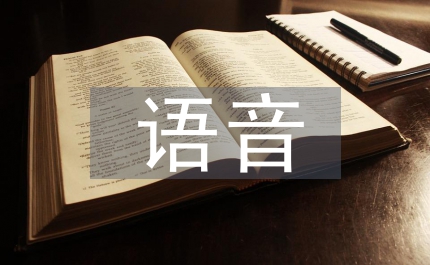语音知识讲和练
前言:本站为你精心整理了语音知识讲和练范文,希望能为你的创作提供参考价值,我们的客服老师可以帮助你提供个性化的参考范文,欢迎咨询。

近年来,中考英语试题,对语音知识的测试越来越热门,其内容主要包括音素、重音和语调三个方面。下面将分别给予介绍:
一、音素:所考查的内容主要包括元音音素和辅音音素(共四十八个),因涉及面较广,不再详述。(后附近几年所考查音素的主要题型。)
二、重音:重音可分为单词重音和句子重音两种。
1.单词重音:英语单词由于音节的数量不一,就出现了读起来有轻有重的现象。一般地,每个单词都有一个音节是重读的,称重读音节;其余的音节不重读,称非重读音节。但有的多音节词,除了一个重读音节之外,还有一个次重读音节。重读音节的符号是:"′",次重读音节的符号是:"@①"。单音节必须重读,不标符号。
例:name[neim]letter[′let@②]information[@①inf@②′mei∫@②n]
那么单词重读有无规则可循?回答是肯定的。单词重读的规则一般是:
①单音节词均重读。例:beg[beg],put[put]
②双音节词一般第一个音节重读。
例:doctor[′d@③kt@②]better[′bet@②]apple[′aepl]但是如有前缀a-,be-,re-,dis-,mis-,de-等双音节词,则第二个音节重读。
例:about[@②′baut],again[@②′gen],address[@②′dres],beside[bi′said],report[ri′p@③:t],mistake[mis′teik],decide[di′said]
另外,双音节词的合成词,一般第一个音节重读。例:blackboard[′blaekb@③:d]、homework[′h@②umw@②:k]但也有两音节均重读的:
′four′teen、′un′fair、′hel′lo、′up′stairs、′down′stairs、′un′touched、′out′side、′Chi′nese、′nine′teen等。
③多音节词一般是倒数第三个音节重读。
例:wonderful[′wnd@①ful],immediately[i′mi:dj@②tli],interested[′intristid]
但双音节词加上前缀或后缀构成的多音节词,仍按原来的词根重音来读。例:con′ductor,′carefully,dis′cover,as′sistant等。
④-ic,-tion,-sion之前的音节要重读。
例:′question,ope′ration,compo′sition,′topic,de′cision。为了帮助初三学生更好地记忆、朗读单词,正确地辨音,毕业复习时我把初中全部单词按重音归纳出来。单音节词一般本身就重读。如:bag,desk等。双音节词和多音节词一般重音在第一个音节上。如:′present′vegetable等。现着重归纳出重音位置较特殊的单词,这样有利于学生复习。实践证明,效果甚好。
(一)重音在第二个音节上的单词:
aboutagreeacrossalreadyamong
aboveaddressafraidagainago
alongaloneanotheraroundaway
arriveAustraliaAustralianAmericaAmerican
becausebeforebelowbecomebecame
beginbeginningbehindbesidebetween
bananacomputerCanadianconductordecide
developdictationdeliciousDecemberenjoyable
exampleexamexceptexcuseexpensive
eraserelevenenoughforgetfulforget
goodbyeherselfhimselfhoorayimportant
instructioninventinventioninventoridea
insideinsteaditselfJulyJapan
machinemuseumNovembero''''clockOctober
preferproducepolitepolitelypoliceman
potatoperhapsreceiveresultreturn
rememberreportSeptembersurprisetomato
tonighttogetherTorontotowardtomorrow
todaythemselvesunusualuntilunhappy
unitedwithoutyourselfyourselves
(二)两个重读音节的词:OKfifteenfourteenthirteensixteenseventeeneighteennineteenafternoonChinesesoutheastsouthwestunlikenortheastnorthwestoutsideuntrueupstairslordspeakerheadmasterheadteacherdownstairsretellTV
(三)前有一个次重读音节,后又有一个重读音节的单词:
Japaneseunderstandunderstoodoperationourselvespopulationeducationexaminationcongratulation
2.句子重音:句子重音,即句子中某些单词需要重读。一般地,句中的名词、动词(助动词和be有时例外)、形容词、副词、数词和感叹词需重读;代词(指示代词、疑问代词例外)、介词、冠词和连词不需要重读。
例:′Thisisa′book.It''''s′red.′Sit′down.动词be的各种形式均不重读,但在句末出现时,一般要重读。
Is′thata′book?′Yes,it′is.
另外,be的否定形式一定重读。′No,it′isn''''t.单音节介词一般不重读,而双音节介词一般重读。例:It''''sonthe′table.It''''s′besidethe′table.
所有的句子是否都根据此规则去做就可以了呢?不行,还要根据具体的语言环境分析对待。如上句中使用过的词,下句中紧接着再出现而不强调时,一般不重读。下面略举几例:
根据对话的情景,找出划线部分一般重读的单词。
①—DoyouspeakEnglish?—No,Idon''''tspeakEnglish.
A.No,I,speakB.don''''t,speak,EnglishC.No,don''''tD.No,I,speak,English
解:根据一般规律,实词重读、虚词不重读。但从具体情况来看,speak,English均属第二次出现的不再传达新信息的实词,未被强调,不需重读。故排除A、B、D,答案C。
②—WhatdoesXiaoLido?—Heisateacherlikeme.
A.teacher,meB.teacher,likeC.teacher,like,meD.teacher
解:按一般规则,人称代词不重读。但从具体的语言环境看,表示强调或对比的单词,无论实词、虚词均重读。故答案选A。
③—Tomdidn''''tgotoschoolyesterday,didhe?—No,hewenttothehospitaltoseehismother.
A.No,went,hospital,see,motherB.mother,seeC.went,see,motherD.No,went,see
析:根据一般规则和具体的语言环境来看,应选择答案A。
三、语调:基本语调是降调和升调,其规则是:
陈述句、祈使句、感叹句、特殊疑问句均读降调。
一般疑问句读升调。(语气婉转的祈使句,特殊情况下的陈述句也读升调。)选择疑问句,前升后降(指or前后)。
反意问句的陈述部分读降调;疑问部分,如表示怀疑或无把握读升调,如有把握读降调。
例:Come@④in.What''''syour@④name?Isthata@⑤jeep?Don''''tdoit@⑤thatway.Westudy@⑤Chinese,@⑤maths@⑤Englishandother@④lessons.光知道这些规则不行,还须根据具体的语言环境灵活运用。现举例说明之:
1.—Dotheyhaveacar?
—Pardon?(Ibegyourpardon?)
—Iaskedyouiftheyhaveacar.
A.升、升、降B.升、降、降
C.升、升、升D.升、降、升
解:Ibegyourpardon.有两种读法:读升调时,表示请对方再说一遍;读降调时表示请对方原谅。从对话的内容和情景看,应读升调,故选A。
2.—Isyourmotherin?
—No,shewenttoNewYorkyesterday.
—Wheredidshego?
A.降、升、降B.降、降、升
C.升、降、升D.升、降、降
解:一般地,特殊问句应读降调,但从具体对话的情形看,答话人已说出问话人所问的具体地点,只是问话的人没听清,想让对方再说一遍,所以此特殊问句应读升调。故选C。
3.—WhendidyougettoknowLaoLi?
—Theyearbeforelast.
—Thenyou''''veknowneachotherforabouttwoyears,haven''''tyou?
A.升、降、降B.降、降、降
C.升、升、降D.降、降、升
解:反意问句的读法有两种:当提问者无把握时,疑问部分读升调;当提问者确有把握时,疑问部分读降调。从此对话的情景看,回答者已说出是前年认识的,自然提问者可以有把握地推算出答者与老李相识两年了,只是想让对方证实一下,故用降调。所以选B。
练习
一、从A、B、C、D中找出与前面所给单词的斜体部分读音相同的选项。
()1.saidA.explainB.rail
C.trainD.again
()2.dangerA.aheadB.break
C.insteadD.catch
()3.soonA.foolishB.good
C.cookD.took
()4.grandmaA.rangB.wallet
C.ableD.save
()5.bankA.wonderB.unfair
C.angryD.disappointed
二、找出下面单词斜体部分的读音与其他三个不同的单词:
()1.A.matterB.dangerC.camelD.bad
()2.A.monthsB.bathsC.mouthsD.clothes
()3.A.memberB.neverC.feverD.temple
()monC.modelD.forest
()5.A.trainB.saidC.raiseD.tail
三、分辨每组单词中斜体部分的读音,在A、B、C、D中选择答案,A.四单词有一种读音B.二种读音C.三种读音D.四种读音()1.manyfamouschancecarry
()2.saltwhatreportfour
()3.postmovenonehot
()4.breakcheapreadymeat
()5.sayswayspaysdays
四、下面每组四个单词中的斜体部分若有一个与所给音标读音相同的选A,若有两个选B,三个选C,四个选D。
()1.[i:]eatrealcheatsteam
()2.[i:]teaheadtheatrefreezeP>()3.[i]capitalshipcaptainmountain
()4.[e]againsaidtreasureafraid
()5.[e]evenevermessageWednesday
五、单词配音:
六、把下列单词按斜体部分的读音归类。(只填编号)
A.southB.danceC.lightD.third
E.farF.downG.worldH.shine
[α:]____________[au]_____________
[@②:]_____________[ai]____________七、从四个选项中选出一个重音位置与其它三个不同的单词:
()1.A.overB.even
C.musicianD.quietly
()2.A.excuseB.enjoyC.reportD.unfair
()3.A.headmasterB.shortcoming
C.becauseD.already
()4.A.decideB.without
C.exerciseD.prepare
()5.A.againstB.almost
C.apologizeD.correctly
()6.A.spiritB.seagullC.replyD.pyramid
()7.A.whereverB.throughout
C.repeatD.hardly
()8.A.reallyB.happen
C.frightenD.pronounce
()9.A.modernB.foreign
C.receiveD.famous
()10.A.regretB.except
C.politicsD.piano
()11.A.excuseB.explain
C.enoughD.problem
()12.A.fascinationB.alone
C.researchD.asleep
()13.A.heavenB.dustman
C.disappearD.medicine
()14.A.liberationB.musician
C.educaionD.operation
八、在下列各组单词中找出含有两个重音的选项:
()1.A.yourselfB.volleyball
C.untouchedD.Tuesday
()2.A.topicB.outside
C.telegraphD.silent
()3.A.restaurantB.November
C.museumD.nineteen
()4.A.ChineseB.mixture
C.horribleD.animal
()5.A.handwritingB.hello
C.boyhoodD.assistant
九、根据对话情景,下面划线部分中,哪些单词一般重读。
()1.—Wheredidyourbrotherstudybeforehejoinedthearmy?
—HestudiedattheNo.2MiddleSchool.
A.He,studied
B.studied,No.2MiddleSchool
C.No.2MiddleSchoolD.He,at,the
()2.—Howlonghaveyoubeenhere?
—I''''vebeenhereforafewminutes.
A.few,minutesB.have,afewminutes
C.I''''ve,minutes
D.here,for,few,minutes
()3.—Istheballonthetable?
—No,it''''sunderthetable.
A.under,tableB.table
C.No,underD.No,table
()4.—Willyougowithmetotheparkthisafternoon?
—Yes,IwillifI''''mfree.
A.Yes,ifB.I,will
C.free,I''''mD.Yes,free
()5.—Whydidyoucometoschoollatethismorning?
—BecauseIhadbreakfastlate.
A.Because,lateB.had,breakfast
C.Because,had,breakfast,late
D.breakfast,late
十、指出下面每组对话中的三个句子一般情况下应读的语调。
()1.—Excuseme,whichisthewaytothelibrary?
—Youareanewstudent,aren''''tyou?
—Yes,Iam.
A.升、升、降B.降、升、升
C.降、降、降D.降、升、降
()2.—Whatbeautifulflowerstheyare!
—Doyoulikethem,too?
—Yes,Ilikethemverymuch.
A.升、升、降B.升、降、降
C.升、降、升D.降、升、降
()3.—Whataretheydoingthere?
—Idon''''tknow.
—Let''''sgoandhavealook,shallwe?
A.降、降、降B.降、降、升
C.升、降、升D.升、升、降
()4.—WhatcanIdoforyou?
—Doyouhave"FromEarthtoMoon"?
—I''''mafraidwehaven''''t.
A.升、升、升B.降、升、降
C.升、降、降D.降、降、升
()5.—Areyougoingtotownbybikeorbybus?
—Bybus.
—Whenareyouleaving?
A.降、升、升B.升、升、降
C.降、降、降D.升、降、升
Key:
一、1.D2.B3.A4.A5.C
二、1.B2.A3.C4.A5.B
三、1.D2.B3.D4.C5.B
四、1.C2.B3.D4.C5.C
五、1.A2.B3.D4.C5.A
六、[α:]:B,E[au]:A,F[@②:]:D,G[ai]:C,H
七、1.C2.D3.A4.C5.B6.C7.D8.D9.C
10.C11.D12.A13.C14.B
八、1.C2.B3.D4.A5.B
九、1.C2.A3.C4.D5.C
十、1.C2.D3.B4.B5.C(公务员之家整理)

